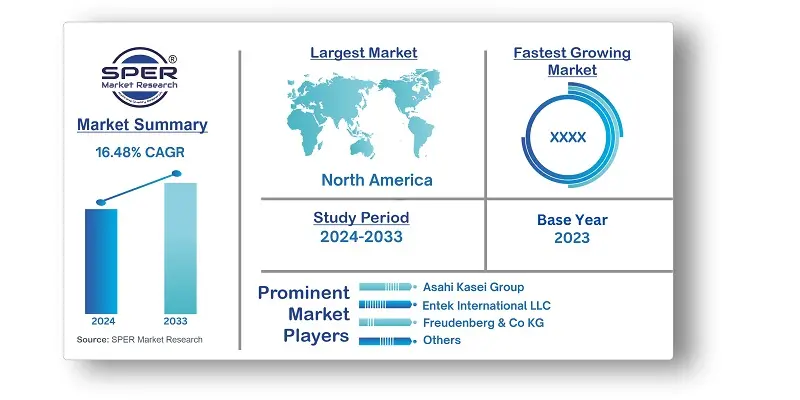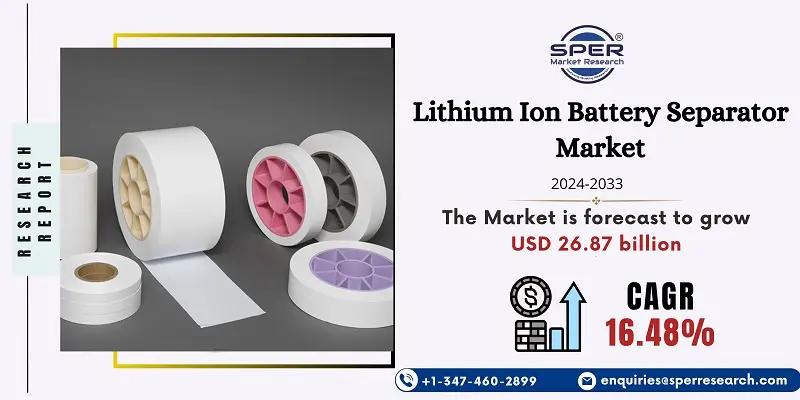
Lithium Ion Battery Separator Market Growth, Size, Trends, Share, Revenue and Future Outlook
Lithium Ion Battery Separator Market Size- By Type, By Material, By Thickness, By Technology, By End User- Regional Outlook, Competitive Strategies and Segment Forecast to 2033
| Published: Apr-2024 | Report ID: POAE2432 | Pages: 1 - 231 | Formats*: |
| Category : Power & Energy | |||
- The U.S. Department of Energy and Solvay have finalized an agreement in December 2023 to construct a plant in Augusta, GA for the production of battery-grade PVDF, which is utilized in electric car batteries as a separator coating and lithium-ion binder. The building is anticipated to open for business in 2026. With this deal, Solvay's position in the battery separator industry will grow considerably.
- In January 2022: ENTEK purchased AEF, a major provider of material handling systems. Building both extrusion and material handling equipment, ENTEK extended its production capabilities in its recently constructed plant in Henderson, NV, delivering the essential space and resources to support the expansion of the united firms.
- In March 2021: Asahi Kasei Corporation increased the capacity of its Mizayaki plant's Li-ion battery (LIB) separator manufacture to meet escalating demand for electric vehicles.


| Report Metric | Details |
| Market size available for years | 2020-2033 |
| Base year considered | 2023 |
| Forecast period | 2024-2033 |
| Segments covered | By Type, By Material, By Thickness, By Technology, By End User |
| Regions covered | North America, Asia-Pacific, Latin America, Middle East & Africa and Europe |
| Companies Covered | Asahi Kasei Group, Entek International LLC, Targray Technology International Inc, Freudenberg & Co KG, Mitsubishi Plastics Inc, TEIJIN Limited, Porous Power Technologies LLC, UBE Industries Ltd, W-Scope Corporation, SK Innovation Co Ltd, Celgard LLC, Sumitomo Chemical Company Limited, ENTEK, Natrion. |
- Market Players
- Investors
- End-users
- Government Authorities
- Consulting and Research Firm
| By Type: |
|
| By Material: |
|
| By Thickness: |
|
| By Technology: |
|
| By End User: |
|
- Global Lithium Ion Battery Separator Market Size (FY’2024-FY’2033)
- Overview of Global Lithium Ion Battery Separator Market
- Segmentation of Global Lithium Ion Battery Separator Market By Type (Microporous, Ceramic-coated, Composite)
- Segmentation of Global Lithium Ion Battery Separator Market By Material (Polypropylene, Polyethylene, Nylon, Others)
- Segmentation of Global Lithium Ion Battery Separator Market By Thickness (16µm, 20µm, 25µm)
- Segmentation of Global Lithium Ion Battery Separator Market By Technology (Wet Processing, Dry Processing)
- Segmentation of Global Lithium Ion Battery Separator Market By End User (Automotive, Consumer Electronics, Industrial, Others)
- Statistical Snap of Global Lithium Ion Battery Separator Market
- Expansion Analysis of Global Lithium Ion Battery Separator Market
- Problems and Obstacles in Global Lithium Ion Battery Separator Market
- Competitive Landscape in the Global Lithium Ion Battery Separator Market
- Impact of COVID-19 and Demonetization on Global Lithium Ion Battery Separator Market
- Details on Current Investment in Global Lithium Ion Battery Separator Market
- Competitive Analysis of Global Lithium Ion Battery Separator Market
- Prominent Players in the Global Lithium Ion Battery Separator Market
- SWOT Analysis of Global Lithium Ion Battery Separator Market
- Global Lithium Ion Battery Separator Market Future Outlook and Projections (FY’2024-FY’2033)
- Recommendations from Analyst
1.1. Scope of the report1.2. Market segment analysis
2.1. Research data source2.1.1. Secondary Data2.1.2. Primary Data2.1.3. SPER’s internal database2.1.4. Premium insight from KOL’s2.2. Market size estimation2.2.1. Top-down and Bottom-up approach2.3. Data triangulation
4.1. Driver, Restraint, Opportunity and Challenges analysis4.1.1. Drivers4.1.2. Restraints4.1.3. Opportunities4.1.4. Challenges4.2. COVID-19 Impacts of the Global Lithium Ion Battery Separator Market
5.1. SWOT Analysis5.1.1. Strengths5.1.2. Weaknesses5.1.3. Opportunities5.1.4. Threats5.2. PESTEL Analysis5.2.1. Political Landscape5.2.2. Economic Landscape5.2.3. Social Landscape5.2.4. Technological Landscape5.2.5. Environmental Landscape5.2.6. Legal Landscape5.3. PORTER’s Five Forces5.3.1. Bargaining power of suppliers5.3.2. Bargaining power of buyers5.3.3. Threat of Substitute5.3.4. Threat of new entrant5.3.5. Competitive rivalry5.4. Heat Map Analysis
6.1. Global Lithium Ion Battery Separator Market Manufacturing Base Distribution, Sales Area, Ingredients6.2. Mergers & Acquisitions, Partnerships, Product Launch, and Collaboration in Global Lithium Ion Battery Separator Market
7.1. Global Lithium Ion Battery Separator Market Size, Share and Forecast, By Type, 2020-20267.2. Global Lithium Ion Battery Separator Market Size, Share and Forecast, By Type, 2027-20337.3. Microporous7.4. Ceramic-coated7.5. Composite
8.1. Global Lithium Ion Battery Separator Market Size, Share and Forecast, By Material, 2020-20268.2. Global Lithium Ion Battery Separator Market Size, Share and Forecast, By Material, 2027-20338.3. Polypropylene (PP)8.4. Polyethylene (PE)8.5. Nylon8.6. Others
9.1. Global Lithium Ion Battery Separator Market Size, Share and Forecast, ByThickness, 2020-20269.2. Global Lithium Ion Battery Separator Market Size, Share and Forecast, ByThickness, 2027-20339.3. 16µm9.4. 20µm9.5. 25µm
10.1. Global Lithium Ion Battery Separator Market Size, Share and Forecast, By Technology, 2020-202610.2. Global Lithium Ion Battery Separator Market Size, Share and Forecast, By Technology, 2027-203310.3. Dry Processing10.4. Wet Processing
11.1. Global Lithium Ion Battery Separator Market Size, Share and Forecast, By End User, 2020-202611.2. Global Lithium Ion Battery Separator Market Size, Share and Forecast, By End User, 2027-203311.3. Automotive11.4. Consumer Electronics11.5. Industrial11.6. Others
12.1. Global Lithium Ion Battery Separator Market Size and Market Share
13.1. Global Lithium Ion Battery Separator Market Size and Market Share, By Region (2020-2026)13.2. Global Lithium Ion Battery Separator Market Size and Market Share, By Region (2027-2033)13.3. Asia-Pacific13.3.1. Australia13.3.2. China13.3.3. India13.3.4. Japan13.3.5. South Korea13.3.6. Rest of Asia-Pacific13.4. Europe13.4.1. France13.4.2. Germany13.4.3. Italy13.4.4. Spain13.4.5. United Kingdom13.4.6. Rest of Europe13.5. Middle East and Africa13.5.1. Kingdom of Saudi Arabia13.5.2. United Arab Emirates13.5.3. Qatar13.5.4. South Africa13.5.5. Egypt13.5.6. Morocco13.5.7. Nigeria13.5.8. Rest of Middle-East and Africa13.6. North America13.6.1. Canada13.6.2. Mexico13.6.3. United States13.7. Latin America13.7.1. Argentina13.7.2. Brazil13.7.3. Rest of Latin America
14.1. Asahi Kasei Group14.1.1. Company details14.1.2. Financial outlook14.1.3. Product summary14.1.4. Recent developments14.2. Entek International LLC14.2.1. Company details14.2.2. Financial outlook14.2.3. Product summary14.2.4. Recent developments14.3. Targray Technology International Inc.14.3.1. Company details14.3.2. Financial outlook14.3.3. Product summary14.3.4. Recent developments14.4. Freudenberg & Co. KG14.4.1. Company details14.4.2. Financial outlook14.4.3. Product summary14.4.4. Recent developments14.5. Mitsubishi Plastics Inc.14.5.1. Company details14.5.2. Financial outlook14.5.3. Product summary14.5.4. Recent developments14.6. TEIJIN Limited14.6.1. Company details14.6.2. Financial outlook14.6.3. Product summary14.6.4. Recent developments14.7. Porous Power Technologies LLC14.7.1. Company details14.7.2. Financial outlook14.7.3. Product summary14.7.4. Recent developments14.8. UBE Industries Ltd14.8.1. Company details14.8.2. Financial outlook14.8.3. Product summary14.8.4. Recent developments14.9. W-Scope Corporation14.9.1. Company details14.9.2. Financial outlook14.9.3. Product summary14.9.4. Recent developments14.10. SK Innovation Co Ltd14.10.1. Company details14.10.2. Financial outlook14.10.3. Product summary14.10.4. Recent developments14.11. Celgard LLC14.11.1. Company details14.11.2. Financial outlook14.11.3. Product summary14.11.4. Recent developments14.12. Sumitomo Chemical Company Limited14.12.1. Company details14.12.2. Financial outlook14.12.3. Product summary14.12.4. Recent developments14.13. ENTEK14.13.1. Company details14.13.2. Financial outlook14.13.3. Product summary14.13.4. Recent developments14.14. Natrion14.14.1. Company details14.14.2. Financial outlook14.14.3. Product summary14.14.4. Recent developments14.15. Others
SPER Market Research’s methodology uses great emphasis on primary research to ensure that the market intelligence insights are up to date, reliable and accurate. Primary interviews are done with players involved in each phase of a supply chain to analyze the market forecasting. The secondary research method is used to help you fully understand how the future markets and the spending patterns look likes.
The report is based on in-depth qualitative and quantitative analysis of the Product Market. The quantitative analysis involves the application of various projection and sampling techniques. The qualitative analysis involves primary interviews, surveys, and vendor briefings. The data gathered as a result of these processes are validated through experts opinion. Our research methodology entails an ideal mixture of primary and secondary initiatives.



Frequently Asked Questions About This Report
PLACE AN ORDER
Year End Discount
Sample Report
Pre-Purchase Inquiry
NEED CUSTOMIZATION?
Request CustomizationCALL OR EMAIL US
100% Secure Payment






Related Reports
Our Global Clients
Our data-driven insights have influenced the strategy of 200+ reputed companies across the globe.




















